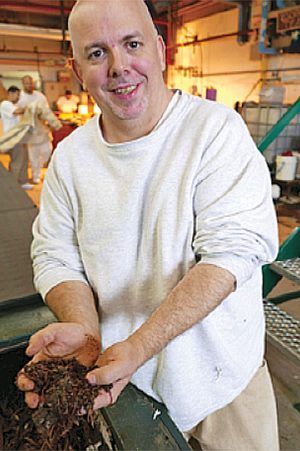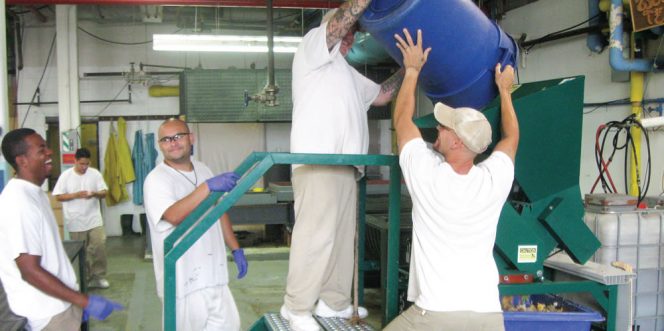Sustainability in Prisons’ vermicomposting certification highlights how environmental science collaborations in prison benefit society and incarcerated people alike.
Nick Hacheney and Kelli Bush
BioCycle May 2018

“These prisoners …. are fathers who care about the world their children are growing up in, they are environmentalists who care about the planet …,” said Nick Hacheney of his fellow “worm farmers” at the certification ceremony. Photo courtesy of Sustainability in Prisons Project
On February 6, 2018, five prisoners at the Monroe Correctional Complex, Washington State Reformatory Unit (MCC-WSRU) became certified Vermiculture and Composting Specialists. This was the culmination of several years of work by the Sustainability in Prisons Project (SPP) in collaboration with incarcerated individuals, the Washington Department of Corrections (WA Corrections), Tilth Alliance, and University Beyond Bars (UBB).
The program requires at least 1,000 hours of work in order to earn a certificate. This includes at least 800 hours of vocational practicum in the prison using vermicomposting, black soldier fly, and Bokashi fermenting methods to convert the prison’s more than 20,000 pounds/month of food waste into valuable fertilizer. (”Correctional Facility Adopts Multiple Food Scraps Practices,” October 2017) An additional 200 hours are dedicated to academic study, participation in numerous workshops, aptitude testing in several biological management systems and demonstrating proficiency on several pieces of equipment. Near the end of the yearlong certification course, program participants facilitated training workshops on various composting methods for staff and volunteers from Tilth Alliance.
At the graduation ceremony, certificate recipients spoke with deep gratitude and pride about the personal satisfaction involved in participating in authentic environmental work. Nick Hacheney said of his fellow “worm farmers:”
“It might surprise some people to learn that there are prisoners doing jobs that some would find difficult and at times even repulsive because they actually care about big issues like global warming and water quality. But these guys are more than prisoners. They are fathers who care about the world their children are growing up in, they are environmentalists who care about the planet and they are advocates who understand the needs of a growing world population.”
Many of the men gave a shout out to Dr. Sally Brown of the University of Washington (and BioCycle columnist and Editorial Board member), who has provided technical assistance and program support. They also thanked prison officials, Tilth Alliance, University Beyond Bars and especially the SPP for working with them to make this certification possible.

Food scraps are unloaded into a shredder at the Monroe Correctional Complex. Photo courtesy of Sustainability in Prisons Project
Project Mission
The mission of Sustainability in Prisons Project (SPP) is to empower sustainable change by bringing nature, science, and environmental education into prisons (see “Department of Corrections Walks The Walk On Sustainability,” October 2015). Through collaborations with incarcerated people, scientists, corrections staff, students and program partners, SPP aims to promote education, conserve biodiversity, practice sustainability, and help build healthy communities. This work is founded on the idea that environmental science collaborations in prison benefit society and incarcerated people alike. After conducting several successful pilot programs from 2002-2007, SPP was formalized as a partnership between WA Corrections and The Evergreen State College in 2008.
Today SPP programs have been implemented in 12 Washington State prisons, with SPP-modeled programs in multiple other states and countries. A few program examples include raising endangered butterflies, cultivating native plants for restoration, recycling, composting, organic gardening, restoring wheelchairs, beekeeping, and offering science and sustainability workshops. A selection of these programs include certifications.
The Vermiculture and Composting Specialist certificate is the newest addition. The vermicomposting program at Monroe Correctional Complex has been successfully operating for several years, primarily with the support of incarcerated participants and corrections staff. Program partners were thrilled to add a certificate to this existing program and the process for developing the new certification is an excellent example of the types of collaboration possible in prisons.
Although there has been limited research on the relationship between environmental programs in prisons and recidivism rates, the studies that have taken place are pretty astounding. One study of the Green Prison Program at Riker’s Island showed the graduates of that program had a 14 percent reconviction rate after one year compared to a 65 percent rate for Riker’s general population. A self-published study of the Insight Garden Program at San Quentin showed that of 117 inmates who participated in the program, only 10 percent returned to prison within 3 years compared to California’s 64 percent statewide rate (insightgardenprogram.org/research-studies).
SPP is working with partners to better understand program impacts. For the men receiving their Vermiculture and Composting Specialist certificates, the evidence for positive impacts is obvious. As one young man speaking with tears in his eyes about his personal journey to achieve his certificate said, “we’re doing more than just recycling food waste. We’re recycling people” (see “From Drugs To Bugs,” May 2018).
Nick Hacheney is founder of the Vermicompost program at Monroe Correctional Facility in Monroe Washington. Kelli Bush is Director of the Sustainability in Prisons Project. Learn more by contacting SPP.










